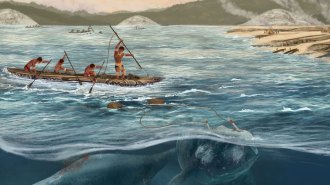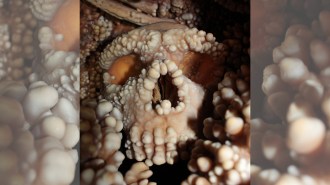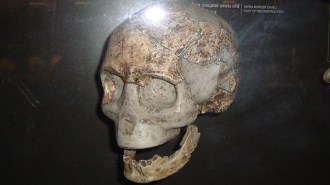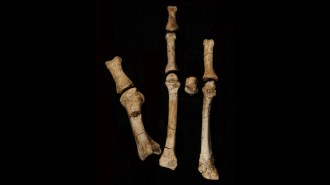Famine and disease may have driven ancient Europeans’ lactose tolerance
Widespread milk consumption might not have been the force behind an ability to digest dairy

Some people like drinking milk more than others, but it helps to be lactose tolerant. This genetic trait spread among ancient Europeans not because they drank a lot of milk but as a result of recurring famines and disease outbreaks, a new study suggests.
Nathan Dumlao/Unsplash
Ancient Europeans may have evolved an ability to digest milk thanks to periodic famines and disease outbreaks.
Europeans avidly tapped into milk drinking starting around 9,000 years ago, when dairying groups first reached the continent’s southeastern corner, researchers report July 27 in Nature. Yet it took several thousand years before large numbers of Europeans evolved a gene for digesting lactose, the sugar in milk, the investigators say.
These discoveries — based on animal fat residue samples from hundreds of archaeological sites and a trove of DNA data — undermine an influential idea that milk use dramatically increased as the product’s nutritional and health benefits drove the evolution of lactose tolerance, say biogeochemist Richard Evershed of the University of Bristol in England and colleagues.
Milk drinkers who can’t digest lactose experience diarrhea, gas, bloating and intestinal cramps. Those uncomfortable reactions were too mild to move the evolutionary needle toward lactose tolerance on their own, Evershed’s group says. But during periodic famines and infectious disease outbreaks, lactose-induced diarrhea became fatal for severely malnourished individuals in farming communities, the scientists suggest. Those recurring threats hotwired the evolution of lactose tolerance, they contend.
Evershed’s report “comprehensively rules out” widespread milk consumption as the evolutionary force behind lactose tolerance, says bioarchaeologist Oliver Craig of the University of York in England. Further research needs to clarify the scale and extent of famines or infectious disease episodes that may have influenced how ancient Europeans digested milk, adds Craig, who did not participate in the new study. Investigators must also keep in mind that cheese and other low-lactose dairy products date to as early as around 7,400 years ago in Europe (SN: 12/12/12). If these foods were widely available, it’s unclear why lactose intolerant Europeans would not have survived times of famine or disease, Craig says.
Evershed’s team mapped estimated frequencies of milk use across Europe from around 9,000 to 500 years ago by analyzing previously published data from animal fat residues extracted from more than 13,000 pottery fragments at about 550 archaeological sites.
At the beginning of that time span, migrating farmers introduced dairying to southeastern Europe’s Balkan Peninsula, where residents embraced regular milk drinking, the investigators say. Milk use then fluctuated over time in different parts of the continent. After about 7,500 years ago, relatively heavy milk use characterized western France, northern Europe and the British Isles. Dairying occurred less often in central Europe.
Evershed’s team also tracked the emergence and spread of the main gene responsible for lactose tolerance using published ancient DNA data from nearly 1,800 Europeans and Asians. The earliest European evidence of a gene variant in adults responsible for boosting the activity of lactase, an enzyme that confers tolerance by chemically breaking down lactose, dates to about 6,650 years ago, the researchers say. But this trait, known as lactase persistence, did not become common in Europe until around 3,000 years ago, they find.
Before that time, increasing levels of lactase persistence tended to align with population busts linked to famines in particular regions, the researchers report. Between 8,000 and 4,000 years ago, excavated farming sites across Europe display signs of periodic population declines that were influenced by severe food shortages, the researchers say (SN: 10/1/13).
Estimates of settlement density, a measure of how closely together people lived, also tended to decline at times of increasing lactase persistence. The spread of animal-borne infections such as salmonella lowered settlement densities as residents unable to digest lactose suffered an excess of deaths, the scientists suspect. In those periods of malnourishment and illness, lactase persistence boosted access to badly needed nutrients in milk, Evershed’s group speculates.
But archaeologist Ron Pinhasi of the University of Vienna is not convinced the famine and disease theory holds up. Diarrhea causes death more often in malnourished children, he says, so he questions whether it would have led to enough adult fatalities to trigger the evolution of milk tolerance. No current proposal explains how lactase persistence spread, he says.
In other parts of the world, and for equally mysterious reasons, regular milk consumption doesn’t necessarily stimulate the spread of lactose tolerance. For instance, lactose tolerance rarely occurs among milk-drinking Central Asian herders but biological signs of lactose tolerance often appear in East African Hadza hunter-gatherers, who don’t drink milk.






